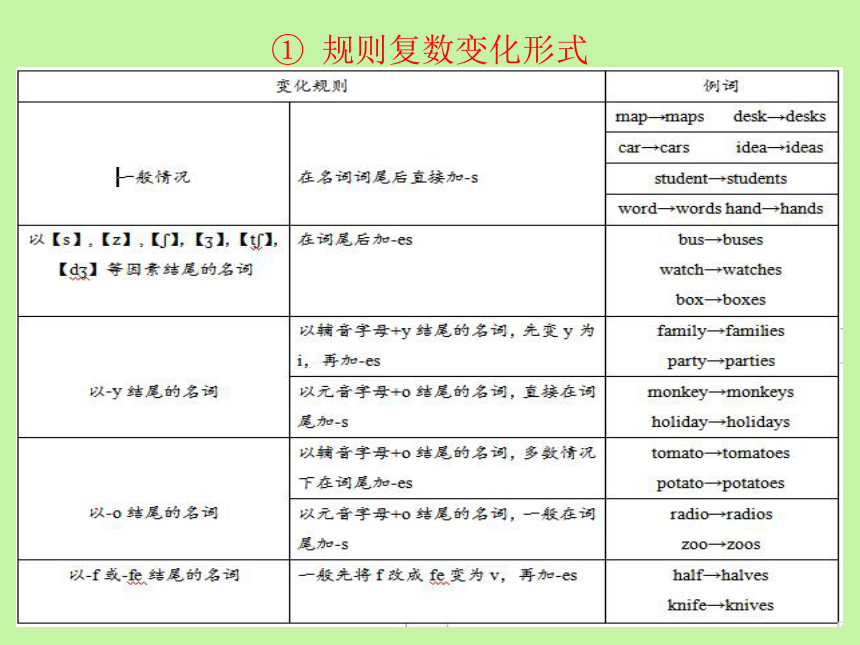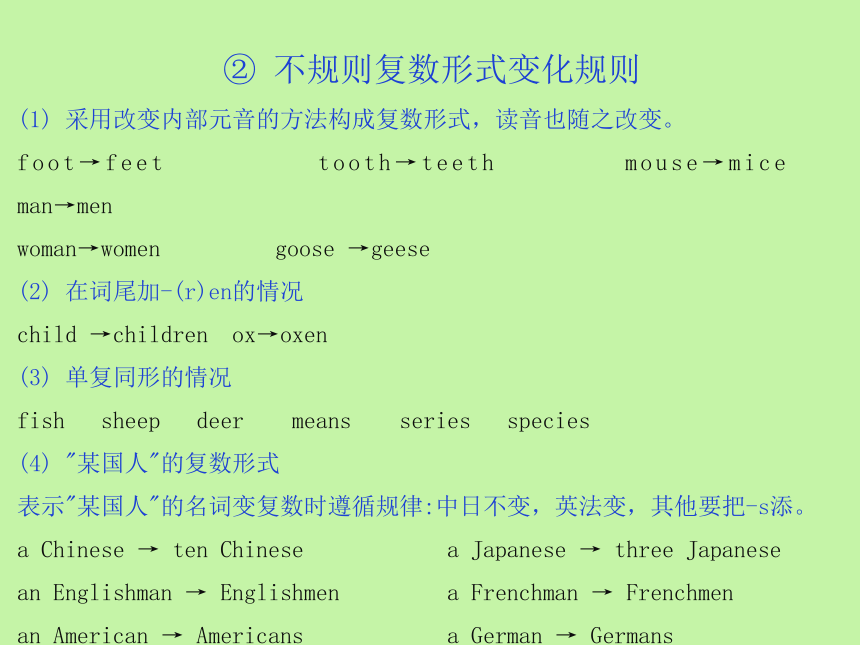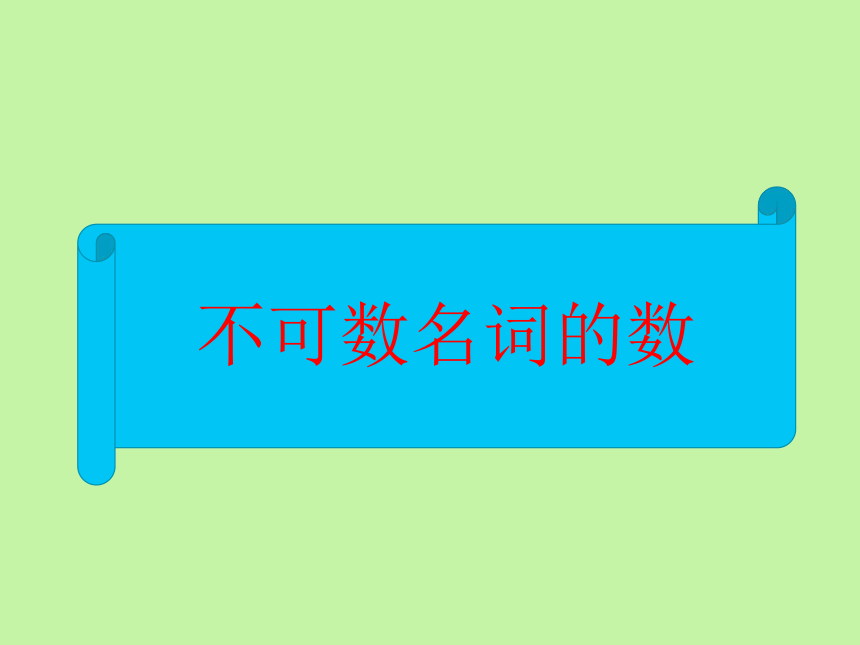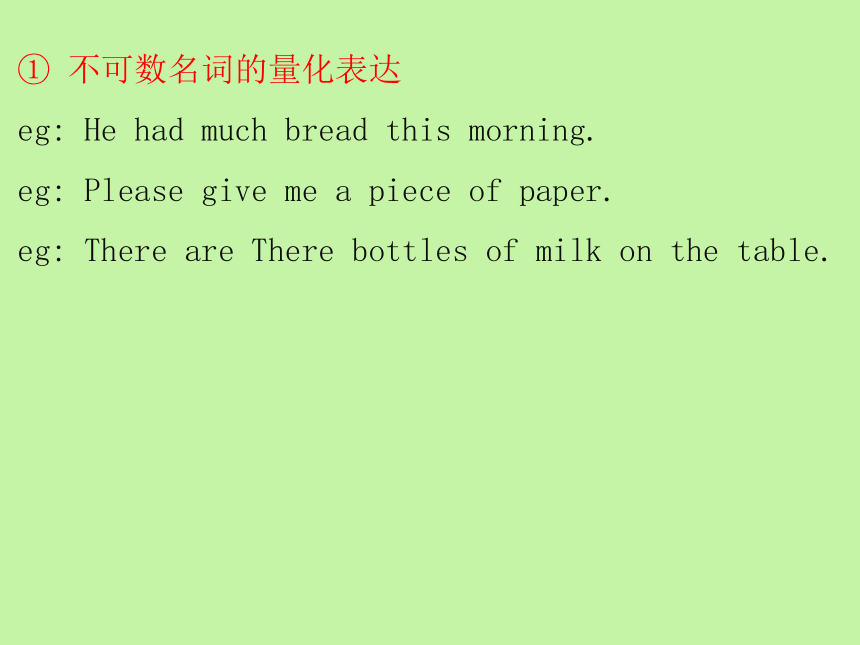中考英语语法大全——名词(共24张PPT)
文档属性
| 名称 | 中考英语语法大全——名词(共24张PPT) |  | |
| 格式 | ppt | ||
| 文件大小 | 1.7MB | ||
| 资源类型 | 教案 | ||
| 版本资源 | 通用版 | ||
| 科目 | 英语 | ||
| 更新时间 | 2022-04-10 18:47:30 | ||
图片预览









文档简介
(共24张PPT)
1.名词的定义
名词是表示人、事物、地点、现象及其他抽象概念等名称的词。
2.名词的分类
名词分为专有名词和普通名词两类。普通名词又分为个体名词、集体名词、物质名词和抽象名词。个体名词与集体名词多数是可数名词,而物质名词与抽象名词多数是不可数名词。
可数名词的数
① 规则复数变化形式
② 不规则复数形式变化规则
(1) 采用改变内部元音的方法构成复数形式,读音也随之改变。
foot→feet tooth→teeth mouse→mice man→men
woman→women goose →geese
(2) 在词尾加-(r)en的情况
child →children ox→oxen
(3) 单复同形的情况
fish sheep deer means series species
(4) "某国人"的复数形式
表示"某国人"的名词变复数时遵循规律:中日不变,英法变,其他要把-s添。
a Chinese → ten Chinese a Japanese → three Japanese
an Englishman → Englishmen a Frenchman → Frenchmen
an American → Americans a German → Germans
不可数名词的数
① 不可数名词的量化表达
eg: He had much bread this morning.
eg: Please give me a piece of paper.
eg: There are There bottles of milk on the table.
's所有格
构成
's所有格的用法
A. 大多表示有生命的名词的所有关系
eg: John's clothes are made by hand in Italy.
eg: There are some student's books on the desk.
B. 表示两人或多人共有时,只变化最后一个名词的词尾; 如果为各自所有,各个名词的词尾都要变化。
eg: He is my father and mother's friend.
eg: Frank's and Jane's cars are both Fiat.
C. 表示时间、距离、度量衡、价值、自然现象、国家、城镇等无生命事物的名词,也可用-'s所有格。
eg: The boss gave me two days' holiday because of my illness.
eg: Today's newspaper is on your table.
eg: China's weather is quite different from south to north.
D. 表示诊所、店铺、医院、学校、住宅或公共建筑时,-'s所有格后常常不出现其所修饰的名词。
eg: Little Tom is being scolded at the teacher's office.
eg: I often buy meat at the butcher's shop.
of所有格的构成和用法
(1)一般来说,无生命的名词常用of所有格形式。
eg: The leaves of most trees will fall in autumn.
eg: There is something wrong with the engine of the car.
(2)有时也用来表示人或其他有生命的名词。
eg: When in trouble, I usually ask for the advice of my teachers.
eg: That’s the opinion of my parents, not mine.
双重所有格的用法
“of+-’s所有格/名词性物主代词”构成双重所有格,表示整体中的一个或者一部分。其用法如下:
(1)双重所有格中带有-’s所有格的名词必须是一个明确的限定的指人的名词。
eg: David is a friend of my father’s.
eg: She is a teacher of my son’s.
(2)表示部分概念时,of前面的名词必须为不确指的名词,其前常用不定冠词、数词、不定代词或指示代词。
eg: Some friends of my sister’s will join us in the game.
eg: Many relatives of hers have been abroad.
A. 只修饰可数名词
few 很少几个;几乎没有 a few 有几个
several 有几个 many 很多
a great/good many 很多 a number of 若干
numbers of 很多 quite a few 相当多的
B.只修饰不可数名词
little 很少;几乎没有 a little 有一点
a good/ great deal of 很多 a bit of 有一点
a large/ small amount of 大量的/少量的 much 很多
C.既修饰可数名词又修饰不可数名词
some 一些 a lot of 很多
lots of 很多 plenty of 大量的
most 大多数的 the rest of 剩下的
1.名词的定义
名词是表示人、事物、地点、现象及其他抽象概念等名称的词。
2.名词的分类
名词分为专有名词和普通名词两类。普通名词又分为个体名词、集体名词、物质名词和抽象名词。个体名词与集体名词多数是可数名词,而物质名词与抽象名词多数是不可数名词。
可数名词的数
① 规则复数变化形式
② 不规则复数形式变化规则
(1) 采用改变内部元音的方法构成复数形式,读音也随之改变。
foot→feet tooth→teeth mouse→mice man→men
woman→women goose →geese
(2) 在词尾加-(r)en的情况
child →children ox→oxen
(3) 单复同形的情况
fish sheep deer means series species
(4) "某国人"的复数形式
表示"某国人"的名词变复数时遵循规律:中日不变,英法变,其他要把-s添。
a Chinese → ten Chinese a Japanese → three Japanese
an Englishman → Englishmen a Frenchman → Frenchmen
an American → Americans a German → Germans
不可数名词的数
① 不可数名词的量化表达
eg: He had much bread this morning.
eg: Please give me a piece of paper.
eg: There are There bottles of milk on the table.
's所有格
构成
's所有格的用法
A. 大多表示有生命的名词的所有关系
eg: John's clothes are made by hand in Italy.
eg: There are some student's books on the desk.
B. 表示两人或多人共有时,只变化最后一个名词的词尾; 如果为各自所有,各个名词的词尾都要变化。
eg: He is my father and mother's friend.
eg: Frank's and Jane's cars are both Fiat.
C. 表示时间、距离、度量衡、价值、自然现象、国家、城镇等无生命事物的名词,也可用-'s所有格。
eg: The boss gave me two days' holiday because of my illness.
eg: Today's newspaper is on your table.
eg: China's weather is quite different from south to north.
D. 表示诊所、店铺、医院、学校、住宅或公共建筑时,-'s所有格后常常不出现其所修饰的名词。
eg: Little Tom is being scolded at the teacher's office.
eg: I often buy meat at the butcher's shop.
of所有格的构成和用法
(1)一般来说,无生命的名词常用of所有格形式。
eg: The leaves of most trees will fall in autumn.
eg: There is something wrong with the engine of the car.
(2)有时也用来表示人或其他有生命的名词。
eg: When in trouble, I usually ask for the advice of my teachers.
eg: That’s the opinion of my parents, not mine.
双重所有格的用法
“of+-’s所有格/名词性物主代词”构成双重所有格,表示整体中的一个或者一部分。其用法如下:
(1)双重所有格中带有-’s所有格的名词必须是一个明确的限定的指人的名词。
eg: David is a friend of my father’s.
eg: She is a teacher of my son’s.
(2)表示部分概念时,of前面的名词必须为不确指的名词,其前常用不定冠词、数词、不定代词或指示代词。
eg: Some friends of my sister’s will join us in the game.
eg: Many relatives of hers have been abroad.
A. 只修饰可数名词
few 很少几个;几乎没有 a few 有几个
several 有几个 many 很多
a great/good many 很多 a number of 若干
numbers of 很多 quite a few 相当多的
B.只修饰不可数名词
little 很少;几乎没有 a little 有一点
a good/ great deal of 很多 a bit of 有一点
a large/ small amount of 大量的/少量的 much 很多
C.既修饰可数名词又修饰不可数名词
some 一些 a lot of 很多
lots of 很多 plenty of 大量的
most 大多数的 the rest of 剩下的
同课章节目录
- 词法
- 名词
- 动词和动词短语
- 动词语态
- 动词时态
- 助动词和情态动词
- 非谓语动词
- 冠词
- 代词
- 数词和量词
- 形容词副词及其比较等级
- 介词和介词短语
- 连词和感叹词
- 构词法
- 相似、相近词比较
- 句法
- 陈述句
- 一般疑问句和否定疑问句
- 特殊疑问句及选择疑问句
- 反意疑问句
- 存在句(There be句型)
- 宾语从句
- 定语从句
- 状语从句
- 主谓一致问题
- 简单句
- 并列句
- 复合句
- 主谓一致
- 主、表语从句
- 名词性从句
- 直接引语和间接引语
- 虚拟语气
- 感叹句
- 强调句
- 倒装句
- 祈使句
- 句子的成分
- 句子的分类
- 题型专区
- 单项选择部分
- 易错题
- 完形填空
- 阅读理解
- 词汇练习
- 听说训练
- 句型转换
- 补全对话
- 短文改错
- 翻译
- 书面表达
- 任务型阅读
- 语法填空
- 其他资料
